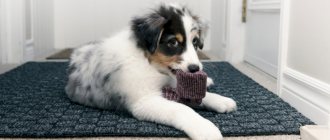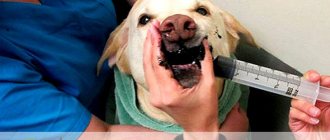How can I work from home with a dog?
The following tips for working with your dog from home will help you stay focused while keeping him happy.
- Start the day with a walk with the dog.
- Give your dog independent space.
- Set specific times to play with your dog.
- Keep your dog active while talking on the phone.
- Resist your dog's demands for attention.
THIS IS INTERESTING: Best Answer: Why do dogs yawn when they are in trouble?
What you need to know before getting a dog
Just like people, all four-legged friends have different personalities. And every dog needs feeding, care, treatment for illness and at least minimal training.
Before you decide to adopt a dog for the first time, you need to be prepared for several nuances:
- The dog demands money. There will be costs for food, vitamins, vaccinations and more.
- A dog takes time. This is not a toy, but actually a new family member.
- If you are adopting a small puppy (and this is most often the case), he will require special attention. Perhaps the dog will misbehave, chew furniture and ask to go outside at a time when you are not ready for this. You will probably have to stay awake for some time and regularly clean up after your pet. It will be better for everyone if you become lenient about his pranks and damaged furniture. By the way, it is better to adopt a puppy no earlier than 1.5-2 months - at an earlier age it is undesirable to separate him from his mother.
- The dog will require certain habits from you - for example, you will have to put many things in the closet, and also regularly monitor the availability of food, cook soups and cereals for it, and wash the dog’s paws after a walk.
- Having a dog requires regular walks at least twice a day.
- You have to train your pet - at least to the minimum, so that he can understand and follow simple commands. If you handle your dog using the whip method, you risk getting a frightened or angry animal that is completely uncontrollable.
- Dogs shed periodically and also emit a specific odor, and in some breeds it is quite strong. You may be allergic to dog hair. It is possible that it will simply be physically unpleasant for you to be in the room. If you don't want to take risks, choose breeds that have virtually no odor.
Before adopting a dog, it is advisable to inquire in advance about the health status of its parents.
Is it worth getting a husky dog?
Huskies have their advantages for living in an apartment - for example, the fact that they are not too large, are hypoallergenic, and their coat is capable of self-cleaning. Huskies are clean and affectionate to their owner. But the disadvantages outweigh.
Firstly, these dogs have a rather short but thick coat with undercoat - and this means problems during shedding 1-2 times a year (depending on the gender of the dog).
Secondly, huskies are a freedom-loving breed that is used to living in Taiga, and in an apartment it can chew furniture. And not out of harm - it’s just that huskies do not tolerate loneliness well. This may lead to the pet simply deciding to run away.
Thirdly, Huskies are not meant to be human companions - they have problems with communication, and training a dog of this breed is unlikely to be successful.
What does your pet need?
- A personalized collar or name tag (a very useful thing in case your pet gets lost; in addition to the pet’s name, don’t forget to add your phone number to the tag).
- Dog food and medicine.
- Bowl for food (it is best if it is made of stainless steel).
- Toys (it’s better to buy more of them right away, about ten of them).
- Leash.
- Nail clippers.
- A bed or house for your pet.
- Time (yours).
Of course, from the very beginning you must choose a name for your pet. Choose carefully. It’s good if the name is not too long (ideally, the name should have two syllables) and does not rhyme with “no”, “lie”, “voice” and so on. You don't want your pet to get confused while learning commands.
Make sure your dog has his own corner of the house where he will feel comfortable and safe.
Start training your pet using simple commands: “sit”, “stay”, “no” and the like. The sooner you teach your pet to be disciplined, the easier it will be for you to get along with him. He will not only become trained, but will also become attached to you and see you as the owner.
Don't forget that socialization is necessary not only for people, but also for dogs. Let your pet play with other dogs. Also, never forget to praise your pet for the progress he makes.
Don't forget about the routine, try to take your dog for a walk at the same time. This will help the dog get used to it and adapt, and you will have much fewer “unexpected incidents” at home.
Don't forget how important it is to find a good veterinarian that you can contact if necessary. Be sure to make sure that the puppy has all the necessary vaccinations. Also make sure that your pet does not have worms, fleas or ticks.
Fleas are a real torment for dogs. Constant itching can drive your pet crazy. And since dogs are often outside and play with other dogs, it is not that difficult to pick up fleas.
Ticks are also a nuisance that can happen to your dog. Check your pet every time after a walk.
Take care of your dog. It is important to brush dogs regularly and get rid of matted hair.
Although dogs, unlike cats, love to swim, there are still exceptions. So teach your pet to bathe from an early age. Be sure to buy dog shampoo, and if you bathe your dog in the bath, don’t forget to buy a rubber mat to prevent your pet from slipping. The dog does not need to be bathed too often, unless, of course, it is a born dirty dog.
Don't forget how important it is to trim your dog's nails. There will be no snags on your carpets, and no scratches on your hardwood floors or your hands.
And of course, don’t forget about the essentials: your dog should always have a bowl of water and food. Don't skimp on food for your pet - choose the best you can afford.
Remember that puppies should be fed more often than adult dogs, but the portions should be smaller.
Check with your veterinarian as this will depend on the dog's breed. But remember: overeating is dangerous for absolutely all dogs.
Also be sure to find out which foods are toxic to your pet's breed. These products can be, for example, chocolate, flour products, raisins, grapes, xylitol (sugar substitute). If your dog likes one of the prohibited foods, then never leave it within your pet's reach.
Make sure your puppy has toys, including a chew bone. This will reduce the risk that your pet will want to chew on your favorite sneakers.
Why do dogs have mental problems?
Are all dogs easy to train? After all, it’s probably easy with one breed, but difficult with another. But Evgeniy is convinced that much depends not on the breed, but on the breeding of dogs.
“There are breeders who take this scrupulously and seriously. And the dogs turn out to be decent, balanced, with a good nervous system. They lead certain lines that produce such puppies. And there are those who see only benefits in this. They just breed dogs and sell the result, which is not always good.
And then those who bought such a puppy go crazy: the dogs are nervous, uncontrollable, they break the house, damage cars, gnaw or dig up plants on the property, yell, howl, it is impossible to work and live with them. And this is an innate behavior. Yes, some things can be corrected by training, but not everything.”
But the problem remains: after all, the dog gets back to the owner, and if he doesn’t work with it himself, doesn’t know how to do anything, he’s not interested in it, then the dog will not obey, unwinds, sits on the owner’s neck. And the owners themselves don’t want to learn, Evgeniy complains.
Experience and work develop a dog's mind
Are mongrels smarter than purebred mongrels? This is a myth, Evgeniy believes: “A dog’s intelligence manifests itself when the owner works with the dog, and if not, then it will not have intelligence. A dog generally becomes smart at 6-7 years old, gaining experience. Up to three years old, a dog can be very young. Then she grows up, and we see more and more intelligence and intelligence in her behavior.”
A stray dog also has a certain life and genetic experience. She herself reaches certain knowledge: life circumstances teach. Stray dogs ride the subway themselves, cross the road at traffic lights, and so on.
“But in general, all dogs are trained, except feral dogs. It is useless to work with them, they are almost a wolf. Yes, they live next to a person, go to markets, eat something there, but they don’t need greater closeness with a person,” explains Evgeniy.
Pros and cons of keeping a dog in an apartment
Having a dog in an apartment has its advantages:
- It has a positive effect on health. You will have to walk with your pet, and this involves physical activity and can even become an alternative to fitness. In many cases, having a dog improves sleep, helps cope with depression and increases life expectancy. And in children, dogs improve immunity.
- The dog develops responsibility; It is good for a person to care about someone.
- Some dog breeds will help you feel safe because they will serve as guards.
- A dog is a wonderful companion, a faithful and devoted friend.
A four-legged friend gives positive emotions and relieves loneliness - its benefits are invaluable.
Minuses:
- A dog takes time - for walks and cooking, walks and grooming, training and socialization.
- Caring for a dog requires financial investment - not everyone is ready for this. Typically, the more expensive the breed, the higher the costs.
- You will have a number of restrictions - for example, renting an apartment with a dog will not be easy. You will also have to think about who will take care of the pet if you go somewhere or get sick. Your schedule will need to be adjusted around your pet.
- The dog sheds and its paws often get dirty, which means you need to be prepared for constant cleaning of the house.
- Pets require patience, since they will not always behave perfectly obediently.
- You will have to be responsible for your dog - both for his physical condition, and for the possible damage that he can cause to other people (scratch someone else's car, bite someone, etc.).
What breeds are not advisable to have in an apartment?
There are several breeds that are not recommended to be taken into an apartment:
- Doberman and other guard breeds - they can be aggressive and unbalanced, dangerous for adults and even more so for children;
- Alabai - such large dogs need spacious enclosures. Like the Doberman, it can be poorly controlled and unpredictable, and has a complex character;
- German Shepherd - despite its intelligence, this dog is not suitable for an apartment because it needs regular physical activity, training and long walks;
- The Rottweiler is a hardy dog that needs an enclosure and intensive training, and in the conditions of an ordinary city apartment it can chew furniture;
- Jack Russell Terrier is a small but hyperactive dog, also temperamental and arrogant, requiring long-term walking;
- The Saint Bernard is a giant dog that will feel uncomfortable in an apartment even due to its size. In addition, he does not tolerate heat very well, and his long hair and increased salivation will cause a lot of inconvenience when cleaning;
- The Bullmastiff is another powerful guard dog that needs a large territory. Unbalanced, aggressive and poorly controlled.
This is not a complete list of dogs that are not recommended to be kept in an apartment. It is better not to have large breeds of dogs, as well as those that are hyperactive, too aggressive, prone to excessive shedding, cause allergies and require long walks.
What breeds do well in an apartment?
There are a lot of dogs that will feel good in an ordinary city apartment. Among them are American or French bulldogs, chixyaks, Pomeranians, dachshunds, Yorkshire terriers and pugs, poodles and cocker spaniels. These breeds do well within four walls, do not tend to chew furniture or damage property, practically do not shed or smell, do not need too long walks and tolerate several hours alone well. They can become reliable and loyal friends who will look forward to their owner getting home from work every evening.
Keeping a dog: how and when to start training
An important part of owning a dog is training it. The ideal pets for companionship with humans are those that are easy to train. As you know, the dog is highly trainable. Even if you adopted a dog without a breed and do not expect anything special from it, at least minimal education and training are necessary. There are many examples when owners themselves spoil a dog that is not naturally stupid and obedient - for example, they take it to bed with them or teach it to say goodbye to the table, do not stop theft or barking for no reason. And when it comes to large fighting breeds, lack of training can have fatal consequences for both you and those around you.










